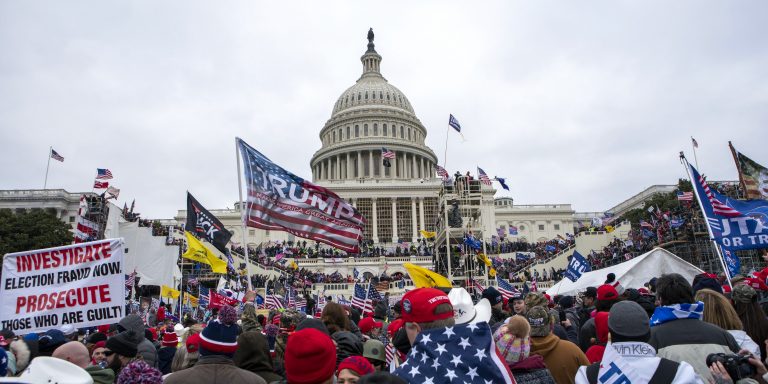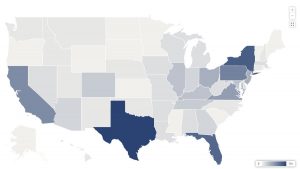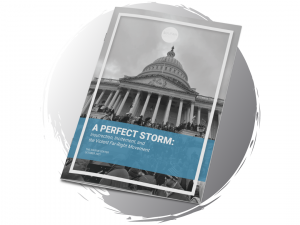INTELBRIEF
January 6, 2022
IntelBrief: U.S. Marks Somber One Year Anniversary of Capitol Insurrection

Bottom Line Up Front
- As the United States marks the one-year anniversary of the Capitol insurrection which took place on January 6, 2021, none of the politicians who encouraged the subversion of American democracy has been held to account.
- The symbolic importance of January 6 cannot be overstated; what occurred was not befitting a country that prides itself on promoting democracy, human rights, and the rule of law – at home and abroad.
- The good news is that much of the violence many analysts predicted in the wake of January 6 has not come to pass—there were no major terrorist attacks on U.S. soil in 2021.
- The bad news is that January 6 catalyzed the emergence of new forms of violent extremism, contributed to the expansion of the far-right extremist ecosystem and mainstreamed anti-government sentiment.
One year ago today, violent insurrectionists, far-right extremists, and conspiracy theorists attempted to stage a coup fueled by disinformation and stoked by former U.S. President Donald Trump. As the United States prepares to mark the anniversary of the January 6, 2021 Capitol insurrection, the country is left with more questions than answers. Among these questions is why no single politician who provided rhetorical support (or even operational advice) and encouraged the subversion of American democracy has been held to account. More than 700 individuals have been charged with federal crimes related to the storming of the Capitol; however, there has been a complete lack of accountability for any politicians (including former President Trump) who promoted the dangerous falsehoods about a stolen election that propelled the mob’s violent riot one year ago, or those politicians impeding a bipartisan government commission to get to the bottom of it. The insurrection itself gravely sullied the image of the United States both at home and abroad—it was the first time since the Civil War in the 1860s that the U.S. failed to achieve a peaceful transfer of power from one administration to the next and audiences at home and abroad were confronted with the fragility of American democracy and influence.
Incredulously, significant?numbers of Republicans—71% according to a University of Massachusetts Amherst poll—still believe in “the Big Lie,” that President Joseph Biden and the Democratic Party “rigged” or “stole” the election. Even though there is no evidence to support this claim, which was pushed by former President Trump and amplified by his ardent supporters, it remained the primary motivation for those storming the Capitol. Contributing to the threat posed by violent extremism is the growing connection between disinformation and domestic terrorism. As Homeland Security Secretary Alejandro Mayorkas recently commented, “I think it’s very important to state that words matter. False narratives about a stolen election have an impact on the threat landscape.” Secretary Mayorkas went on to describe the challenges posed by lone actors and loosely affiliated networks of violent extremists. While at least 12% of those charged with crimes related to January 6 are members of formal organizations like the Proud Boys or the Oath Keepers, approximately 88% were unaffiliated, forming a massive pool of free agent extremists. Potentially contributing to this, a Washington Post and University of Maryland poll has indicated that 1 in 3 Americans say violence against the government can sometimes be justified.
The symbolic power of January 6 cannot be overstated. American citizens attempted to violently overturn a democratic election when the candidate they supported lost absent any factual indications of foul play. These are actions unbefitting a country that prides itself on promoting democracy, human rights, and the rule of law – at home and abroad. U.S. soft power is on life support, and the hypocrisy of promoting democracy abroad while undermining it at home has not been lost on citizens in other countries, including many who have long viewed the U.S. as a beacon of hope and a model of stability. In combination with questions about the effectiveness of “hard power” in securing long-term strategic victories in places like Afghanistan, this deficit of influence should be alarming to policymakers and citizens. After all, what credibility can Washington have in criticizing Moscow and Beijing for illiberalism and autocracy when one of its two major political parties looked the other way as a violent coup occurred? Just this week, former President Trump praised Hungarian Prime Minister Viktor Orban, most well known as a champion of “illiberal democracy,” and offered his endorsement for Orban’s reelection campaign. Fox News host and Conservative icon Tucker Carlson visited Hungary and aired his show from Budapest last October, all while adulating Orban, clearly praising his Hungarian host’s authoritarian tendencies.
The good news is that much of the violence many analysts predicted in the wake of January 6 did not come to pass. Indeed, there were no major terrorist attacks on U.S. soil in 2021 though the apparent normalization of threats of violence against lawmakers and widespread acceptance of the use of violence for political purposes remains concerning. While the absence of mass casualty terror attacks could be due in part to the ongoing COVID-19 pandemic, with attacks artificially suppressed, the Biden administration also deserves credit for taking the threat of domestic terrorism seriously and crafting a comprehensive strategy, the first of its kind, to assess the risks and allocate resources where needed. The strategy included multiple pillars designed to both prevent and counter violent extremism in the United States. A separate initiative sought to root out violent extremism from the Department of Defense, including the armed services of the U.S. military. Moreover, the effective law enforcement approach taken to identifying and arresting insurrectionists is to be commended.
The bad news is that January 6 has in some ways served as a catalyst for the emergence of new forms of violent extremism, as the far-right extremist tent has broadened to include conspiracy theorists of all stripes and those against COVID-19 lockdowns and measures (including vaccines). Just like far-right extremism, this movement has morphed into a global phenomenon with a strong anti-government underpinning. Research by The Soufan Center has demonstrated that the January 6 insurrection at the U.S. Capitol strengthened the online and offline far-right movement, including existing and emerging transnational connections, including at the ideological, material and operational levels. Threats posed by violent far-right groups have often been dismissed, because they were not perceived as being part of an organized movement or as having transnational connections. But the continued proliferation and resonance of neo-Nazi ideology and violent white supremacy is a global phenomenon, and increasing connections and linkages between far-right extremists will strengthen existing networks and continue to help the movement evolve in dangerous ways.
RELEVANT TSC RESOURCES:
 |
Mapping Insecurity: Tracking Violent Domestic Extremism |
 |
A Perfect Storm: Insurrection, Incitement, And The Violent Far-Right Movement |